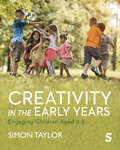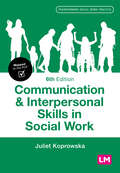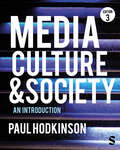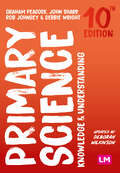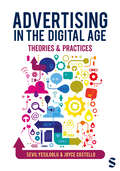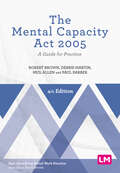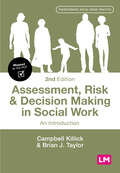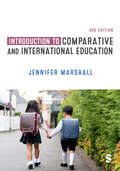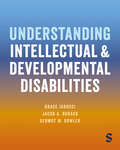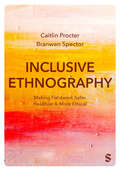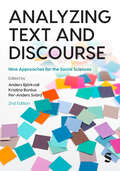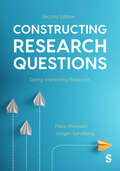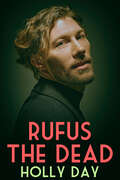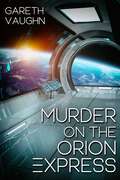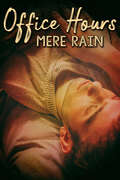- Table View
- List View
Creativity in the Early Years: Engaging Children Aged 0-5
by Simon TaylorThis book offers an accessible and comprehensive new introduction to the subject and practise of creativity in early years education. Taylor takes a uniquely rights-based and inclusive approach to creativity, providing students with a holistic, internationally-minded overview of creativity and its place both inside and outside the classroom. Sections focus on: Defining creativity and its benefits Different modes of creativity Creativity in a policy and social context Creative pedagogy in practice Creative leadership Each chapter offers questions for critical reflection, illustrative contemporary case studies, and ample suggestions for further reading.
Communication and Interpersonal Skills in Social Work (Transforming Social Work Practice Series)
by Juliet KoprowskaCommunication and interpersonal skills are an essential part of practice. Taking a skills-based approach, this book looks at research, theories, approaches and processes, demonstrating how they relate directly to practice. It will help you to understand the benefits that good communication skills can bring to your work with children and families, adults, groups, and those with communication difficulties.
Communication and Interpersonal Skills in Social Work (Transforming Social Work Practice Series)
by Juliet KoprowskaCommunication and interpersonal skills are an essential part of practice. Taking a skills-based approach, this book looks at research, theories, approaches and processes, demonstrating how they relate directly to practice. It will help you to understand the benefits that good communication skills can bring to your work with children and families, adults, groups, and those with communication difficulties.
Media, Culture and Society: An Introduction
by Paul HodkinsonAs digital media come to saturate more and more of our societies, what benefits and challenges do they bring? Who holds power in contemporary media industries, and do they have our best interests at heart? What role do media play in our cultural identities and the relations between communities? How much control do media users have over the role of platforms, algorithms and data in their lives? Media increasingly dominate our social and cultural worlds, affecting issues of power, politics, knowledge, identity, and everyday life. But what are the implications of the mediatisation of contemporary life, and how should we make sense of it? In this fully updated and revised edition of his bestselling textbook, Paul Hodkinson explores the social and cultural significance of media in the age of digital platforms. Encompassing media technologies, industries, texts and users, and combining coverage of classic theories with extensive new material on platforms, social media, datafication and more, this book will equip you to navigate the fast-moving field of media and communication studies. Media, Culture and Society provides an essential overview for students studying introductory media modules, as well as depth for those further into their media degree.
Media, Culture and Society: An Introduction
by Paul HodkinsonAs digital media come to saturate more and more of our societies, what benefits and challenges do they bring? Who holds power in contemporary media industries, and do they have our best interests at heart? What role do media play in our cultural identities and the relations between communities? How much control do media users have over the role of platforms, algorithms and data in their lives? Media increasingly dominate our social and cultural worlds, affecting issues of power, politics, knowledge, identity, and everyday life. But what are the implications of the mediatisation of contemporary life, and how should we make sense of it? In this fully updated and revised edition of his bestselling textbook, Paul Hodkinson explores the social and cultural significance of media in the age of digital platforms. Encompassing media technologies, industries, texts and users, and combining coverage of classic theories with extensive new material on platforms, social media, datafication and more, this book will equip you to navigate the fast-moving field of media and communication studies. Media, Culture and Society provides an essential overview for students studying introductory media modules, as well as depth for those further into their media degree.
Primary Science: Knowledge and Understanding (Achieving QTS Series)
by Graham A Peacock John Sharp Rob Johnsey Debbie WrightAll the subject knowledge you need to teach primary science. The essential subject knowledge text for primary science. Secure subject knowledge and understanding is the foundation of confident, creative and effective teaching. This comprehensive text, covering the whole primary curriculum, includes interactive tasks, self-assessment questions and links to other resources in all chapters. Primary science matters. This 10th edition includes links to the ITT Core Content Framework and new content on children’s common misconceptions in science.
Primary Science: Knowledge and Understanding (Achieving QTS Series)
by Graham A Peacock John Sharp Rob Johnsey Debbie WrightAll the subject knowledge you need to teach primary science. The essential subject knowledge text for primary science. Secure subject knowledge and understanding is the foundation of confident, creative and effective teaching. This comprehensive text, covering the whole primary curriculum, includes interactive tasks, self-assessment questions and links to other resources in all chapters. Primary science matters. This 10th edition includes links to the ITT Core Content Framework and new content on children’s common misconceptions in science.
Advertising in the Digital Age: Theories and Practices
by Sevil Yesiloglu Joyce CostelloAdvertising is everywhere. Whether you realise it or not, it′s there when you watch your favourite Netflix show, when you scroll through Instagram, and when you search on Google. What′s more, advertisers are becoming more savvy than ever, using new technologies to target adverts to you specifically. So what are we to make of all this? This book will equip you with a thorough understanding of today′s media environment and how ′online′ advertising differs from traditional ′offline′ models. In an age of influencers, big data, AI and social media, the world of advertising looks very different from how it did a generation ago. You will learn not only about various types of advertising, but also about its impact on viewers, from our buying habits to possible harm. Tying theory and concepts to practice, this volume is the ideal complement to courses in advertising, digital media and communication, and will enable you to form a clear picture of the reality of working across promotional media industries.
Advertising in the Digital Age: Theories and Practices
by Sevil Yesiloglu Joyce CostelloAdvertising is everywhere. Whether you realise it or not, it′s there when you watch your favourite Netflix show, when you scroll through Instagram, and when you search on Google. What′s more, advertisers are becoming more savvy than ever, using new technologies to target adverts to you specifically. So what are we to make of all this? This book will equip you with a thorough understanding of today′s media environment and how ′online′ advertising differs from traditional ′offline′ models. In an age of influencers, big data, AI and social media, the world of advertising looks very different from how it did a generation ago. You will learn not only about various types of advertising, but also about its impact on viewers, from our buying habits to possible harm. Tying theory and concepts to practice, this volume is the ideal complement to courses in advertising, digital media and communication, and will enable you to form a clear picture of the reality of working across promotional media industries.
The Mental Capacity Act 2005: A Guide for Practice (Post-Qualifying Social Work Practice Series)
by Robert Brown Debbie Martin Neil Allen Paul BarberThe Mental Capacity Act 2005 and its accompanying Codes of Practice continue to have a huge impact on mental health professionals working with some of the most vulnerable people throughout England and Wales. Whether you are a Social Worker, Best Interest Assessor, Mental Health Nurse, Doctor, Psychiatrist or an Approved Mental Health Professional (AMHP), understanding the Mental Capacity Act and its implications for practice is essential and this indispensable guide will help you do just that. The Mental Capacity Act 2005 is designed to protect and empower individuals who may lack the mental capacity to make their own decisions about their care and treatment and this bestselling book will provide invaluable support to busy practitioners needing to draw on the Act in the following ways: - Sets out the full text of the main body of the Act for quick reference - Contains practical advice and checklists for working with the Act and the main principles and Codes of Practice - Shows how the Mental Health Act and Mental Capacity Act interact so that statutory requirements can be put into practice.
The Mental Capacity Act 2005: A Guide for Practice (Post-Qualifying Social Work Practice Series)
by Robert Brown Debbie Martin Neil Allen Paul BarberThe Mental Capacity Act 2005 and its accompanying Codes of Practice continue to have a huge impact on mental health professionals working with some of the most vulnerable people throughout England and Wales. Whether you are a Social Worker, Best Interest Assessor, Mental Health Nurse, Doctor, Psychiatrist or an Approved Mental Health Professional (AMHP), understanding the Mental Capacity Act and its implications for practice is essential and this indispensable guide will help you do just that. The Mental Capacity Act 2005 is designed to protect and empower individuals who may lack the mental capacity to make their own decisions about their care and treatment and this bestselling book will provide invaluable support to busy practitioners needing to draw on the Act in the following ways: - Sets out the full text of the main body of the Act for quick reference - Contains practical advice and checklists for working with the Act and the main principles and Codes of Practice - Shows how the Mental Health Act and Mental Capacity Act interact so that statutory requirements can be put into practice.
Assessment, Risk and Decision Making in Social Work: An Introduction (Transforming Social Work Practice Series)
by Campbell Killick Brian J. TaylorAs a practising social worker, you will need to be able to make sound judgments in complex contexts and when you are under pressure. This book covers the essential knowledge you will need to understand and develop skills in relation to professional judgement and decision making processes, including: - the use of assessment tools; - engagement in assessment and decision processes; - the context of risk, complexity and uncertainty in practice; - communication and management of risk within social care processes.
Assessment, Risk and Decision Making in Social Work: An Introduction (Transforming Social Work Practice Series)
by Campbell Killick Brian J. TaylorAs a practising social worker, you will need to be able to make sound judgments in complex contexts and when you are under pressure. This book covers the essential knowledge you will need to understand and develop skills in relation to professional judgement and decision making processes, including: - the use of assessment tools; - engagement in assessment and decision processes; - the context of risk, complexity and uncertainty in practice; - communication and management of risk within social care processes.
Introduction to Comparative and International Education
by Jennifer MarshallThis book introduces major themes surrounding comparative and international education, giving you a nuanced understanding of key debates, and thinkers, and the tools necessary to conduct comparisons using secondary sources. Social, economic, historical, and cultural factors are examined in order to investigate the varied contexts in which education takes place around the globe. This new edition includes: New case studies touching on contemporary issues from decolonising the curriculum to the impact of the Covid-19 pandemic on education A new introduction outlining the features of the book and how to use them Updated educational data from around the world and new links to external resources Dr Jennifer Marshall is Senior Lecturer in Education at the University of Derby.
Introduction to Comparative and International Education
by Jennifer MarshallThis book introduces major themes surrounding comparative and international education, giving you a nuanced understanding of key debates, and thinkers, and the tools necessary to conduct comparisons using secondary sources. Social, economic, historical, and cultural factors are examined in order to investigate the varied contexts in which education takes place around the globe. This new edition includes: New case studies touching on contemporary issues from decolonising the curriculum to the impact of the Covid-19 pandemic on education A new introduction outlining the features of the book and how to use them Updated educational data from around the world and new links to external resources Dr Jennifer Marshall is Senior Lecturer in Education at the University of Derby.
Understanding Intellectual and Developmental Disabilities
by Grace Iarocci Jacob A. Burack Dermot M. BowlerWritten by psychologists engaged in research, teaching, and practice, Understanding Intellectual and Developmental Disabilities encourages a nuanced, contextually informed understanding of the development of individuals with developmental disabilities. This accessible book contextualises developmental disability across the lifespan and within social systems. It will help you understand the complex interaction between genetics, environments, and experiences, in relation to specific conditions such as ADHD, autism, foetal alcohol spectrum conditions, and Down syndrome. It also introduces you to the wide range of real-world applications of developmental disabilities research and to some of the current ethical issues around genetic screening and behavioural intervention. Key learning features include: Learning objectives Focus boxes that deliver additional helpful context Chapter summaries Reflective exercises and questions, to test what you’ve learned Recommended videos This book is ideal for students studying atypical development, developmental neuropsychology, and related subjects. Grace Iarocci is Professor of Psychology and the Director of the Autism and Developmental Disabilities Lab at Simon Fraser University Jacob A. Burack is Professor of School/Applied Child Psychology and Human Development at McGill University, Director of the McGill Youth Study Team, and Scientific Director of the Summit Center for Education, Research, and Training Dermot M. Bowler is Professor of Psychology and a founder member of the Autism Research Group at City, University of London
Understanding Intellectual and Developmental Disabilities
by Grace Iarocci Jacob A. Burack Dermot M. BowlerWritten by psychologists engaged in research, teaching, and practice, Understanding Intellectual and Developmental Disabilities encourages a nuanced, contextually informed understanding of the development of individuals with developmental disabilities. This accessible book contextualises developmental disability across the lifespan and within social systems. It will help you understand the complex interaction between genetics, environments, and experiences, in relation to specific conditions such as ADHD, autism, foetal alcohol spectrum conditions, and Down syndrome. It also introduces you to the wide range of real-world applications of developmental disabilities research and to some of the current ethical issues around genetic screening and behavioural intervention. Key learning features include: Learning objectives Focus boxes that deliver additional helpful context Chapter summaries Reflective exercises and questions, to test what you’ve learned Recommended videos This book is ideal for students studying atypical development, developmental neuropsychology, and related subjects. Grace Iarocci is Professor of Psychology and the Director of the Autism and Developmental Disabilities Lab at Simon Fraser University Jacob A. Burack is Professor of School/Applied Child Psychology and Human Development at McGill University, Director of the McGill Youth Study Team, and Scientific Director of the Summit Center for Education, Research, and Training Dermot M. Bowler is Professor of Psychology and a founder member of the Autism Research Group at City, University of London
Inclusive Ethnography: Making Fieldwork Safer, Healthier and More Ethical
by Caitlin Procter Branwen SpectorHow can you do ethnographic field research in a safe way for you and the people you work with? In this nuanced, candid book, researchers from across the globe discuss core challenges faced by ethnographers, reflecting on research from preparation to dissemination and how identity interacts with the realities of doing fieldwork. Building on the work of the editors’ The New Ethnographer Project, which has been seeking to change the way ethnographic methods are approached and taught since 2018, the book: Promotes an inclusive approach that invites you to learn from the challenges faced by a diverse range of scholars. Addresses underexplored issues including emotional and physical safety in the face of ableism, homophobia and racism. Challenges assumptions of what it means to produce knowledge by conducting fieldwork. Whether you’re an undergraduate student or an experienced researcher, this book will help you do fieldwork that is safer, healthier and more ethical.
Inclusive Ethnography: Making Fieldwork Safer, Healthier and More Ethical
by Caitlin Procter Branwen SpectorHow can you do ethnographic field research in a safe way for you and the people you work with? In this nuanced, candid book, researchers from across the globe discuss core challenges faced by ethnographers, reflecting on research from preparation to dissemination and how identity interacts with the realities of doing fieldwork. Building on the work of the editors’ The New Ethnographer Project, which has been seeking to change the way ethnographic methods are approached and taught since 2018, the book: Promotes an inclusive approach that invites you to learn from the challenges faced by a diverse range of scholars. Addresses underexplored issues including emotional and physical safety in the face of ableism, homophobia and racism. Challenges assumptions of what it means to produce knowledge by conducting fieldwork. Whether you’re an undergraduate student or an experienced researcher, this book will help you do fieldwork that is safer, healthier and more ethical.
Analyzing Text and Discourse: Nine Approaches for the Social Sciences
by Anders Björkvall Kristina Boreus Per-Anders SvärdChoose the right methodological tools to answer your research question and know how to use them with this anthology of textual analysis approaches. Each chapter provides not only relevant theoretical background behind each methodology, but also its advantages and challenges, its potential applications, and its relationship to studying social phenomenon. Through step-by-step worked examples of real-world data, you get an in-depth window into each method in action and learn how to apply the same techniques successfully and confidently in your own research. Methods include: • Content analysis • Narrative analysis • Critical discourse studies • Multimodal discourse analysis
Constructing Research Questions: Doing Interesting Research
by Mats Alvesson Jorgen SandbergA key step for researchers wanting to produce interesting and influential theory development is formulating innovative research questions. In this text, Alvesson and Sandberg have developed a problematization methodology for identifying and challenging the assumptions underlying existing knowledge, and for generating research questions that can lead to more impactful theories. The second edition of this popular text has been fully updated, with more illustrative examples and insights from a diverse range of recent studies which explore methods for conducting more innovative research. This book is essential reading for students and researchers looking to formulate interesting research questions and conduct more engaging and original research. Mats Alvesson is Professor of Business Administration at the University of Bath, and also affiliated with Lund University, Stockholm School of Economics and Bayes Business School, City, University of London. Jörgen Sandberg is Professor in the University of Queensland (UQ) Business School and Honorary Professor at Warwick Business School.
Constructing Research Questions: Doing Interesting Research
by Mats Alvesson Jorgen SandbergA key step for researchers wanting to produce interesting and influential theory development is formulating innovative research questions. In this text, Alvesson and Sandberg have developed a problematization methodology for identifying and challenging the assumptions underlying existing knowledge, and for generating research questions that can lead to more impactful theories. The second edition of this popular text has been fully updated, with more illustrative examples and insights from a diverse range of recent studies which explore methods for conducting more innovative research. This book is essential reading for students and researchers looking to formulate interesting research questions and conduct more engaging and original research. Mats Alvesson is Professor of Business Administration at the University of Bath, and also affiliated with Lund University, Stockholm School of Economics and Bayes Business School, City, University of London. Jörgen Sandberg is Professor in the University of Queensland (UQ) Business School and Honorary Professor at Warwick Business School.
Rufus the Dead
by Holly DayRufus will do anything not to remain staked in a coffin, including stealing a psychic and forming a blood bond with him.Rufus Mabuz was a badass assassin until his coven leader had him staked and stored away in a coffin for seven years. He was still a badass assassin, only he couldn’t move. Then one day, the coven leader makes him an offer -- bond with a psychic or stay in the coffin for years to come.Jaki Sage is kept prisoner together with a group of psychics. He’s a psychic too, but a crappy one. He can’t foresee anything. The only thing he can do is look back in time to see what the weather was like around a certain event. Not useful. But then his friend, who can foresee things, tells him to go with Rufus the Dead.Rufus isn’t sure why he’s stealing a psychic and forming a blood bond with him, but anything is better than being staked. Jaki might not know much about vampires, but he thinks he’s better off with Rufus than if he hadn’t run away with him. But then the coven leader demands he uses his skills to find someone, or she’ll put Rufus back in the coffin. How will Jaki be able to find anyone when all he can see is weather?
Murder on the Orion Express
by Gareth VaughnAfter finding a dead man in her office, Hercula Perry simply needs some time away from her job at Hjerson University. When her rich aunt Cynthia books her on the Orion Express, the first-of-its-kind tourism transport to the Moon and back, it's not what Hercula had in mind to escape, but she's not about to pass on the opportunity -- or the free food and drink. She takes the chance to get away from it all for a week, only to find things aren't necessarily smoother far above the earth as they are on its surface.Immediately a passenger dies in suspicious circumstances, pulling Hercula into another questionable death on a ship which won't return home for days. This time, she's determined to figure out what went wrong. This time, she will get to the bottom of it before they return to earth -- or before someone else, maybe even herself, is killed.
Office Hours
by Mere RainLiam works hard. Liam stays out of trouble. Liam gets good grades. Liam has strict parents. Liam ... doesn’t have a lot of self-discipline. He hasn’t been away at college long before his grades start falling. He needs to improve if he’s going to keep his scholarship. And just maybe he could impress Professor Levin with his brains, instead of stammering like an idiot every time spoke to the man.Blaise Levin likes research and being the smartest person in the room. He doesn’t enjoy teaching and has no patience for slackers. He isn’t sure why he keeps giving Liam second chances. Sure, he’s cute when he begs, but Blaise isn’t planning anything inappropriate with a student. Not until Liam starts asking for more than just academic assistance.
